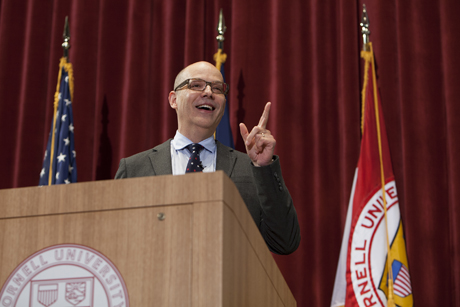Logevall: Despite doubts, presidents stoked Vietnam War
By Susan Kelley

All three U.S. presidents most closely associated with the Vietnam War – John F. Kennedy, Lyndon B. Johnson and Richard Nixon – escalated and perpetuated a war that they privately doubted was either winnable or necessary. And like their French counterparts before them, they deepened their country’s involvement to shore up their political positions at home, said Cornell historian Fredrik Logevall.
“They sent 58,000 Americans to die for a cause they did not fully believe in,” said Logevall, the Pulitzer Prize-winning author of “Embers of War: The Fall of an Empire and the Making of America’s Vietnam.” He outlined how the Vietnam War happened – and the lessons the war teaches – at the Spencer T. and Ann W. Olin Lecture in Bailey Hall June 7 during Cornell Reunion 2013.
A specialist on U.S. foreign relations, Logevall is the John S. Knight Professor of International Studies and director of the Mario Einaudi Center for International Studies. On July 1 he also will become vice provost for international relations.
World War II set the stage for Vietnam War, the longest and bloodiest world conflict during in the second half of the 20th century, Logevall said. The Viet Minh, Ho Chi Minh’s revolutionary organization, emerged from WWII much stronger and better positioned to fight France’s return to Indochina. Colonial powers, especially France, came out drastically weakened, while the United States rose in prominence in world politics.
After France returned to Vietnam in 1946, year after year French policymakers focused less on the future of Indochina and more on domestic political strategizing, careerism and satiating powerful interest groups at home, he said: “The main objective now was to avoid embarrassment and hang on, to muddle through, to avoid outright defeat, at least until the next vote of confidence or the next election.”
In 1954, the Viet Minh dealt France a crushing defeat in the French Indochina War – and the Americans would follow in France’s path. “To study these wars in succession is to experience feelings of déjà vu to a degree I didn’t anticipate when I started, and that I don’t think is adequately underscored in the literature,” Logevall said.
Kennedy understood this historical context and the fundamental problems it posed, Logevall said, pointing to Kennedy’s 1951 diary entries, when the 34-year-old senator then asked, “Could anyone subdue Ho?” Kennedy nonetheless had 11,000 military advisers in Vietnam by the end of 1962. His papers hint that he wanted to withdraw from Vietnam – but only after the 1964 election, Logevall said.
The United States failed to acknowledge that the Viet Minh had staked out a nationalist legitimacy and demonstrated “ruthless commitment, unshakable tenacity and skillful fighting” and that the Viet Minh considered Americans just as guilty as the French for meddling in their affairs. Like Kennedy, Johnson and Nixon were more concerned with political strategizing than voicing their doubts about the war. Meanwhile, a “permissive context” contributed to the escalation. Congress gave increasing permission for military involvement, although most senators and congressmen were privately against it. The press failed to ask deep questions in public despite its skepticism of the war. And public apathy was the order of the day.
Logevall’s “grave conclusion” is that the Vietnam War has a “special resonance” today, because a similar permissive context allowed wars in Iraq and Afghanistan.
However, Logevall said, this permissive context is not inevitable. Over time, the anti-war movement limited the options available to Johnson and Nixon.
And the lessons of the anti-war movement have utility today: Exertion of force can be counterproductive; definitive victory is now rare; ambiguous results will be the norm; and their costs will be much greater than even the most cautious estimates. “For these reasons, the wise statesman is going to use force only as a last resort and only when truly vital national interests are at stake,” he said.
Cornell links to Vietnam War
Fredrik Logevall opened his Reunion talk with a photo from a 1970 antiwar protest in a packed Barton Hall. The massive turnout occurred three weeks before U.S. President Richard Nixon announced that U.S. troops would attack enemy targets in Cambodia, which sparked nationwide protests, Logevall noted. “This suggests to me the degree to which this campus was engaged with this long and difficult struggle in Southeast Asia,” he said.
In fact, Cornell’s connections to the war began long before. In 1945, professor of anthropology Lauriston Sharp warned U.S. State Department officials that America would make a grave mistake if it backed France in its efforts to reclaim control of Indochina.
In 1953, a then-unknown Vietnamese, Ngo Dinh Diem, who would become South Vietnam’s leader and America’s ally, spoke on campus, castigating France for clinging to colonial rule and calling for U.S. assistance to his cause. “Maybe one or two of you from the Class of 1953 were present for Diem’s talk that winter day,” Logevall said.
Cornell even played a role in Logevall’s decision to become a historian of the war. In 1988, Logevall heard the eminent Cornell historian George Kahin speak in Oregon. Kahin had just published a definitive history of the war, “Intervention: How American Became Involved in Vietnam.” Logevall, then an aspiring historian, mustered up the courage to ask Kahin afterward if there was anything more to be said about the war. “I’ll never forget, he said, ‘Young man, intense scholarship on the Vietnam struggle is only in its infancy. Go to it,’” Logevall recalled.
He concluded his lecture with a quote from Bernard Fall, an expert on the First Indochina War who wrote part of his dissertation in Ithaca. Fall once said that the Americans were “dreaming different dreams than the French but walking in the same footsteps.”
Media Contact
Get Cornell news delivered right to your inbox.
Subscribe